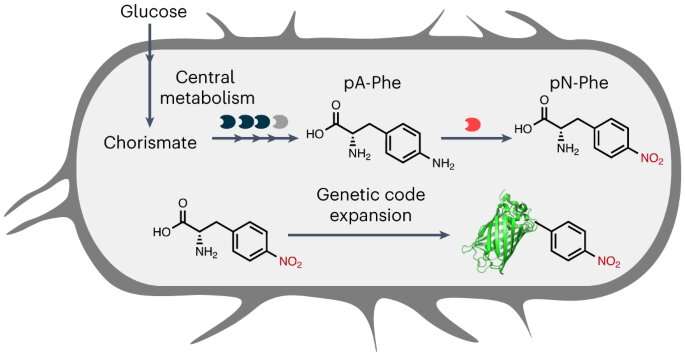This article has been reviewed according to Science X's editorial process and policies. Editors have highlighted the following attributes while ensuring the content's credibility:
fact-checked
peer-reviewed publication
trusted source
proofread
Engineers create bacteria that can synthesize an unnatural amino acid

In a study recently published in Nature Chemical Biology, researchers focused on para-nitro-L-phenylalanine (pN-Phe), a non-standard amino acid that is neither one of the twenty standard amino acids nor observed in nature. pN-Phe has been used by other research groups to help the immune system mount a response to proteins that it does not ordinarily respond to.
"The nitro chemical functional group has valuable properties and has been underexplored by folks who are trying to rewire metabolism," Kunjapur said. "pN-Phe also has a nice history in the literature—it can be added onto a protein from a mouse, delivered back to mice, and the immune system will no longer tolerate the original version of that protein. That ability has promise for the treatment or prevention of diseases that are caused by rogue proteins that the immune system struggles to lock onto."
Genetic code expansion methods allowed the researchers to increase the "alphabet" of available amino acids encoded by DNA. By coupling metabolic engineering techniques with genetic code expansion, the researchers were able to create a system that produces nitrated proteins autonomously.
"Because of the nitro functional group chemistry, the amino acid that we picked as our target for this project was unconventional, and many scientists within our field may not have expected that it could be made using biosynthesis," Kunjapur said.
The next step for this research is to optimize their methods to synthesize higher amounts of nitrated proteins and expand this work into other microorganisms. The long-term goal is to further refine this platform for applications related to vaccines or immunotherapies.
"I think the implications are interesting, in that you can take a bacterium's central metabolism, its ability to produce different compounds, and with a few modifications you are able to expand its chemical repertoire," said Butler. "The nitro functionality is rare in biology and absent from the standard 20 amino acids, but we showed bacterial metabolism is malleable enough that it can be rewired to create and integrate this functionality."
Kunjapur added, "Bacteria are potentially useful drug delivery vehicles. We think we have created a tool that could leverage the ability of bacteria to produce target antigens within the body and exploit the ability of nitration to shine a light on those antigens at the same time."
More information: Neil D. Butler et al, A platform for distributed production of synthetic nitrated proteins in live bacteria, Nature Chemical Biology (2023). DOI: 10.1038/s41589-023-01338-x
Journal information: Nature Chemical Biology
Provided by University of Delaware





















